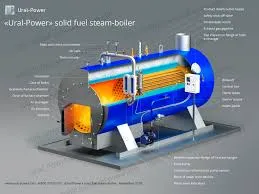
Ara . 04, 2024 10:12 Back to list
how does a oil fired boiler work
How Does an Oil-Fired Boiler Work?
Oil-fired boilers play a critical role in heating systems, particularly in areas where natural gas is not readily available. These boilers utilize oil as their primary fuel source to produce heat, providing warmth for residential and commercial spaces. Understanding the mechanics behind oil-fired boilers is essential for selecting the right heating system and ensuring efficient operation.
At the heart of an oil-fired boiler is the combustion process. The journey begins with the delivery of fuel oil, which is typically stored in a tank located on the property. When there is a demand for heat, the boiler system draws oil from this tank. A pump then propels the oil to a burner, where it is atomized into a fine mist through a nozzle. This atomization is crucial for achieving efficient combustion, as the smaller droplets allow for better mixing with air.
How Does an Oil-Fired Boiler Work?
In a steam boiler, the heated water is converted into steam, which travels through pipes and radiators, providing heat to the desired spaces. Conversely, in a hot water boiler, the heated water is circulated through a system of radiators, baseboards, or in-floor heating systems. Both methods effectively distribute heat throughout a building.
how does a oil fired boiler work

To ensure safety and efficiency, oil-fired boilers are equipped with several components. A safety valve prevents the buildup of excessive pressure, while thermostats regulate the temperature. Additionally, many modern oil-fired boilers come with advanced controls and monitoring systems that optimize combustion, reducing fuel consumption and emissions.
One significant aspect of oil-fired boilers is their efficiency ratings, which indicate how effectively they convert fuel into usable heat. Newer models can achieve efficiency ratings of over 90%, primarily due to improved combustion processes and better insulation. Regular maintenance is essential to sustain these efficiency levels, as neglect can lead to soot build-up, reduced performance, and increased emissions.
Environmentally, oil-fired boilers have faced scrutiny due to the combustion of fossil fuels and the associated carbon emissions. To address these concerns, manufacturers have developed cleaner burning oils and alternative biofuels, which can help reduce the environmental impact of oil-fired heating systems. Furthermore, incorporating supplementary technologies, such as solar thermal systems, can enhance energy efficiency and sustainability.
In conclusion, oil-fired boilers are a reliable heating option for many homeowners and businesses in regions lacking natural gas infrastructure. By understanding how these systems work, from fuel storage and combustion to heat distribution, users can appreciate their efficiency and effectiveness. Regular maintenance and the consideration of cleaner fuel options can also contribute to a more sustainable heating solution, ensuring comfort without compromising environmental responsibility.
-
Best Steam Boiler Design PDF Free Design Calculation & Diagram Downloads
NewsJun.10,2025
-
Hot Boiler Water Heater Efficient Heating Solutions for Home & Commercial Use
NewsJun.10,2025
-
Steam Boiler Safety Devices High-Quality Protection Valves
NewsJun.10,2025
-
Ultimate Steam Boiler Checklist for Safety & Efficiency
NewsJun.10,2025
-
Optimal Hot Water Boiler Temperature Setting Guide
NewsJun.10,2025
-
Effective Hot Water Boiler Chemical Treatment Protect & Maintain
NewsJun.09,2025
Related PRODUCTS






















